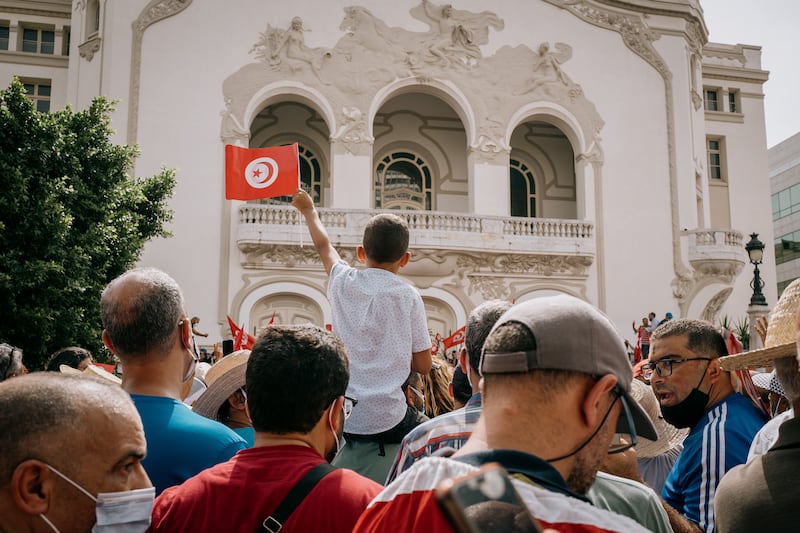Tunisians woke on Friday, the morning of the 11th anniversary of the ousting of former dictator Zine El Abidine Ben Ali, to what felt like deja vu.
Rather than celebrations marking another year of democracy, a curfew and a ban on gatherings – said to be aimed at stemming the tide of the looming Omicron surge – hollowed out city streets in an attempt to keep protesters from gathering.
Exactly one year earlier, the government instituted a similar lockdown, aimed at keeping case counts low and unrest quiet.
That silence lasted mere hours before violent anti-government protests broke out in working class neighbourhoods on the outskirts of the capital and in small towns across the country, eventually spilling on to Tunis's main avenue.
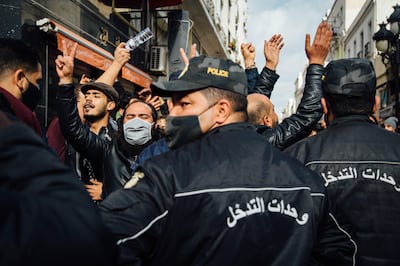
Those protests, against a failing parliament and ineffective ministers more focused on infighting than the catastrophic economic outlook keeping Tunisians poor, would continue throughout the spring and help pave the way for President Kais Saied, a political outsider with a stern, scholarly air, to assume sole control of the country in July.
“Even the most obsessive democratic hypochondriacs among Tunisian analysts were shocked by the speed and crass totality with which he jettisoned Tunisia’s democracy on July 25,” said Monica Marks, an assistant professor of Middle East politics at New York University Abu Dhabi and a close watcher of Tunisia.
Despite the swift descent into one-man rule, which caught many off guard both in Tunisia and around the world, Ms Marks and other analysts say upon closer inspection a series of events both paved the way for Mr Saied and obscured his ultimate aims to the public in the process.
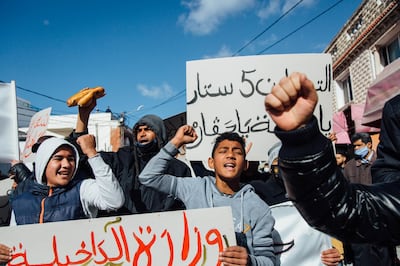
A stand against corruption hobbles the government
While protests bubbled up across the country early last year, behind closed doors at the Kasbah, the seat of government, another fight was brewing. President Saied refused to swear in a raft of new ministers appointed by Prime Minister Hichem Mechici, citing vague concerns over conflicts of interest and corruption.
Though he ran on a platform of fighting corruption, Mr Saied's earlier rhetoric had shied away from accusing his own government of self-dealing. The new tenor would soon become his central message: the current political class were “microbes” and “viruses” destroying the country.
Mr Saied lacked the political finesse to push forward his agenda in the government, but Ms Marks pointed out that “rhetorically he was very successful because he simply dismissed and lambasted all the present politicians – right, left and centre – as microbes who were deeply corrupt” priming the public to distrust those whom they'd elected.
Hobbled by a lack of leadership in key ministries, the government continued at a deadlock. “That stagnation had an impact on the economic and social sides as well,” said Tarek Kahlaoui, a Tunisian political analyst, increasing pressure on everyday citizens and dissatisfaction with the direction the country was headed.
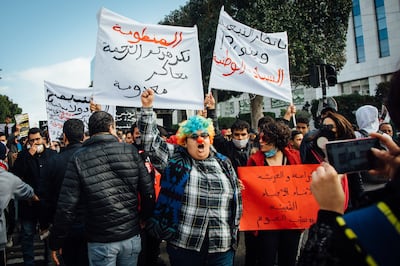
Other warning signs emerged in the late spring that Mr Saied was no longer keen to work with the government he had selected, nor the parliament run by his primary adversary, Rached Ghannouchi, the leader of the Islamist party Ennahda.
Shortly after a trip to Egypt where he met with President Abdel Fattah El Sisi, Mr Saied made a move to consolidate both the military and civilian armed forces under his supervision, despite a clear separation of the two in the constitution. “That was a serious warning sign” that few took notice of, said Ms Marks.
Fighting two kinds of 'virus'
By July, the country was on a collision course with disaster: MPs were throwing chairs at each other on the parliament floor, inflation was rising rapidly, a deal with the IMF to stave off international creditors had stalled and a deadly wave of Covid-19 choked hospitals and sickened thousands without a social safety net.
“There was a total failure of handling Covid-19, especially on the vaccination side,” said Mr Kahlaoui. “This created a huge public trauma. Since Ennahda has been in one way or another in power since 2011, it was blamed mainly for the whole crisis.”
The feeling of exasperation and desperation grew as case counts soared.
“The economy was deteriorating, the public heath situation was getting out of control, and Tunisians were seeing people who they loathed” – people like Ben Ali supporter Abir Moussi and Mr Ghannouchi – “on their TV every day,” said Ms Marks.
“Tunisians heard Kais Saied call those people viruses and they thought, 'Yeah, that's right.'”
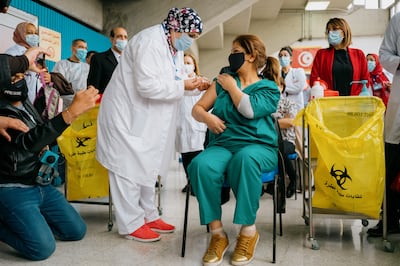
It was no surprise then when Mr Saied made the announcement, late in the evening of July 25, that he was taking sole control of the country for an exceptional, 30-day period, thousands of Tunisians streamed into the streets to celebrate.
Early polling found approval ratings of 87 per cent, and the overall atmosphere in the country was cautiously optimistic.
“The public had been primed for a dive into dictatorship because they were exhausted by ten years in which most people couldn’t taste tangible fruits of the revolution beyond more freedom of expression,” said Ms Marks.
A troubled path ahead
Mr Saied's consolidation of power was swift, but in the six months since he has been slow to reveal his agenda or enact reforms he promised on the campaign trail, as he has grown more isolated and acts primarily alone without dialogue or consultation with major actors like the powerful union or civil society.
Despite growing opposition to Mr Saied, other actors and political parties have failed to create a cohesive or appealing alternative.
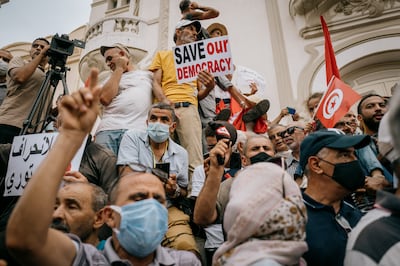
“He’s been railing against the whole system while simultaneously operating on an institutional level that actually made the whole system worse,” said Ms Marks.
Security forces have arrested and detained lawmakers and journalists, barred citizens from flying without justification, and shut down certain media entities.
“The president's supporters say this is normal in an exceptional state, but the president's road map to end the exceptional state was framed only in a speech and has not yet been issued in official decrees,” said Mr Kahlaoui.
That road map includes an electronic referendum to survey the country on their political preferences and views, a referendum on a new constitution wrote by Mr Saied in July, and new parliamentary elections in December after he also reshapes the electoral laws.
It does not include an economic plan, or proposals for reforming the security sector, two major concerns for the public as a whole.
“I think he is very interested in leaving his traces in Tunisian history; he is about legacy,” said Mr Kahlaoui.
“I think this is going to cause more economic and social frustration without reforming the political system.”
